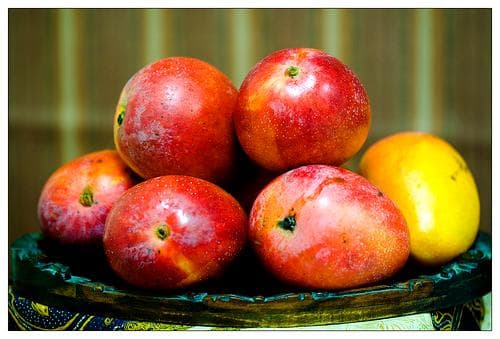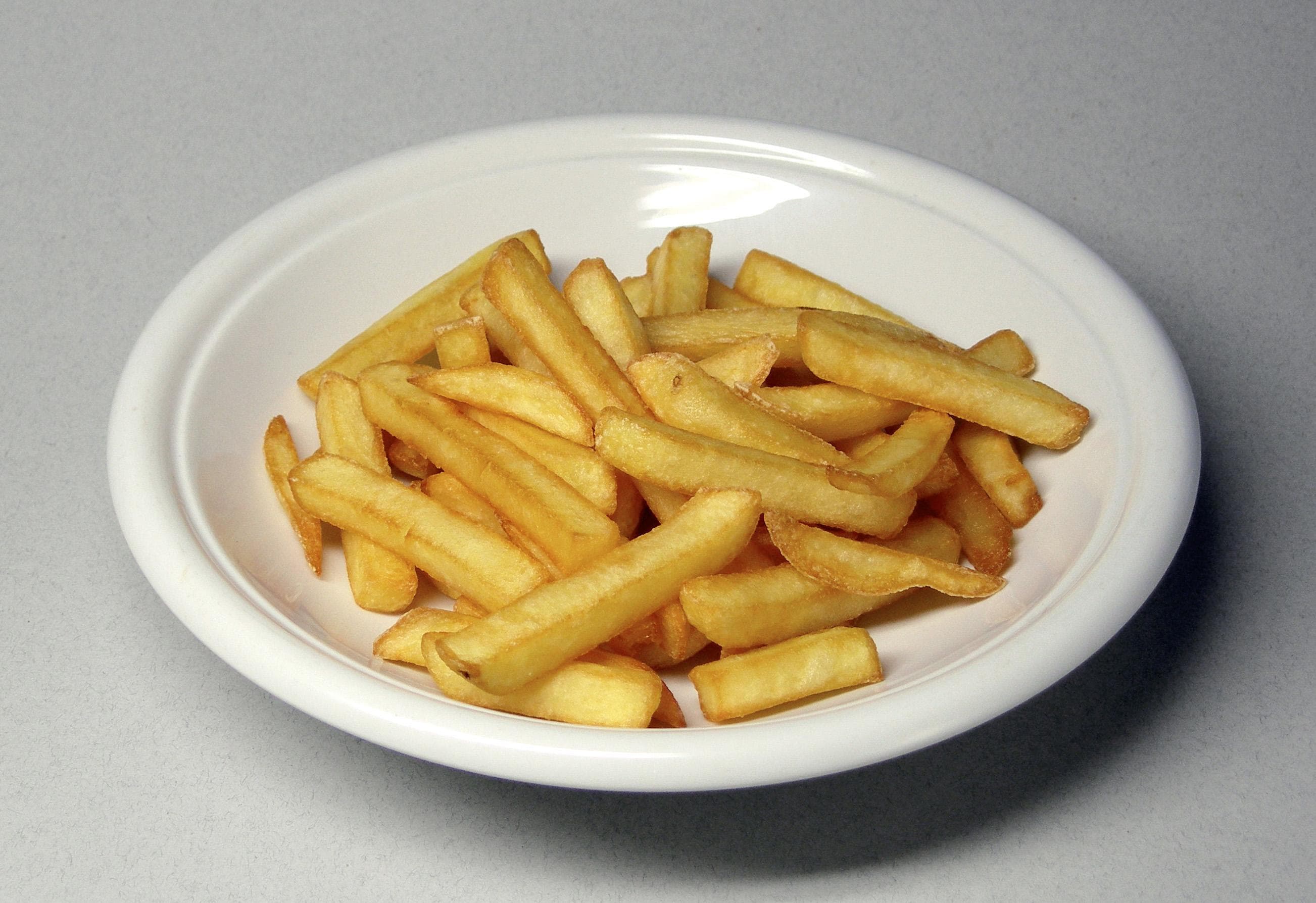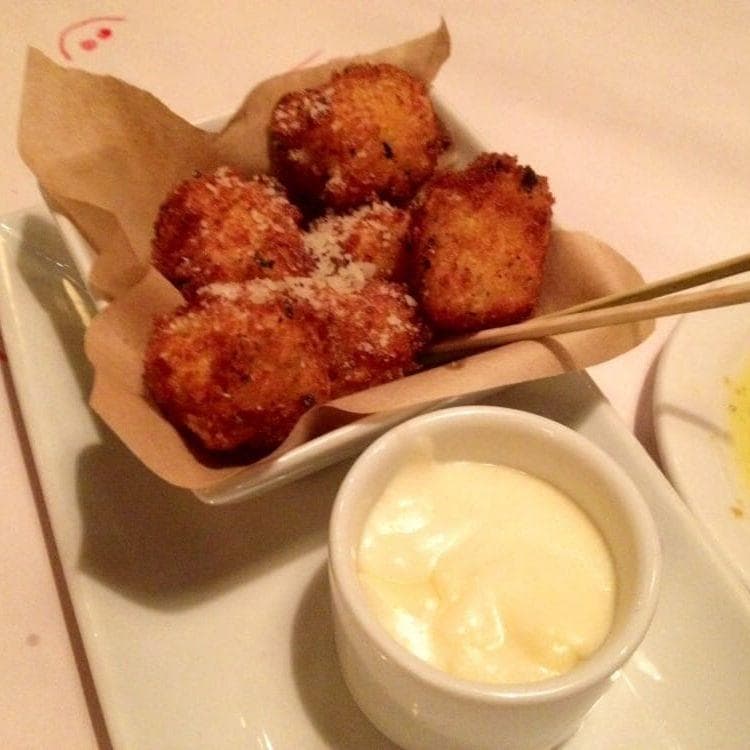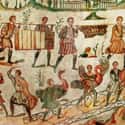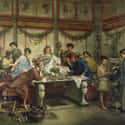-
(#6) Asparagus Pie
Highly regarded in the Roman world, asparagus was described by Pliny the Elder as "extremely wholesome as an ailment to the stomach... it sharpens the eyesight... is good for pains in the chest and spine, and diseases of the intestines... acts as an aphrodisiac, and is an extremely useful diuretic."
While often served cold, Apicius recommended first peeling, washing, and boiling the vegetable to cook it. To make asparagus pie, one had to crush and strain the asparagus before adding pepper, coriander, and onions to a mixture of wine, broth, and oil. After thickening it with eggs, meat from a figpecker - a small bird that enjoyed figs, hence its name - could be added in.
Asparagus pie was then baked and served with sprinkling of pepper.
-

(#5) Hazelnut Custard
Nut custard was a sweet dish enjoyed by Romans as a porridge or a pudding, depending on the amount and type of milk, egg, and flavoring one added to the mix.
Nut custards could also be eaten as turnovers or tarts. One of Apicius's recipes calls for crushing "very fine walnuts and hazelnuts" before toasting them, adding honey, and blending them with "pepper, broth, milk, and eggs, and a little oil."
Another of the sweet nut treats described by Apicius included pine nuts, or pignolia, again chopped and roasted with honey and mixed with pepper, broth, milk, eggs, and still more honey. Raisins could be thrown in, too, for a touch of extra sweetness.
Heat thickened the nut-based mixture, which was then put into molds and "baked in [a] hot water bath." They were cooled and served, probably with more honey drizzled on top.
-
(#9) Lucanian Sausages
Said to have been brought back to Rome by soldiers serving in the South of Italy during the late Republic, Lucanian sausages were served as hors d'oeuvres - Cicero (106-43 BC) once had his "appetite spoilt by [the] olives and Lucanian sausages" served by an associate in Naples - and were among numerous sausages mentioned by Apicius.
Crush pepper, cumin, savory, rue, parsley, condiment, laurel berries and broth; mix with finely chopped fresh pork and pound well with broth. To this mixture, being rich, add whole pepper and nuts. When filling casings carefully push the meat through. Hang sausage up to smoke.
Sausages like botellum included hard-boiled egg yolks, while farcimina integrated brains into the mixture. Sausages were served whole or cut into slices with salt, mustard, pheasant gravy, and cumin.
-
(#3) Ostrich Ragout
Much like flamingo, ostrich was another exotic meat enjoyed by Romans, albeit only on unique occasions. Galen, a second-century Greek physician and scholar, described ostrich meat as "excrementitious and much more difficult to digest than the meat of [other birds]... although their wings are no worse than others."
This didn't stop people from eating it, however. Emperor Elagabalus (r. 218-222) was said to have "served ostriches" at banquets, insisting "the Jews had been commanded to eat them" as a joke mocking Jews within the Roman world.
Apicius has two recipes for ostrich, both dishes that included vegetables, herbs, and chunks of meat in stew-like fashion. One boiled ostrich ragout was seasoned with "pepper, mint, cumin, leeks... dates, honey, vinegar, raisin wine, and broth." Oil was added, as well, and the stock was brought to a boil to cook the ostrich meat. Once the meat was drained, the mixture was thickened before putting the meat back in and serving to taste.
The second ostrich stew featured flavors like "pepper, thyme, honey, mustard," and vinegar.
Ostrich eggs were desirable, as well, with one egg feeding as many as eight people.
-
(#7) White Bread
Bread in the Roman world was tied to social status, with "hard and dirty" bread being enjoyed by poor men and women. As a staple food, bread could be simple, including nothing more than a little salt, or elaborately baked with honey, nuts, and a variety of grains. Pliny the Elder even mentions oyster bread alongside numerous other options.
Wealthy Romans mostly ate white bread, which was made using fine flour from a wheat called siligo. It was often incorporated into other dishes, but aristocratic Romans also ate white bread on its own. They often removed the crust, soaked the bread in a mixture of milk and eggs, fried it in oil, and covered it with honey.
-
(#2) Soft-Boiled Eggs In Pine Nut Sauce
Romans very much enjoyed eggs, and they were often featured as appetizers. Eggs could be fried and served with wine sauce or boiled and seasoned with "broth, oil, pure wine, or... broth, pepper, and laser (a popular herb)."
Another common egg dish was a soft-boiled or poached egg with a sauce made out of pepper, soaked pine nuts, honey, vinegar, and garum (fish paste).
Preparing the pine nuts for the dish would have required soaking them overnight, draining them, and using a mortar to pound them. Once they were mixed with pepper, honey, and fish paste, the sauce was heated while the eggs were boiled. When served, the sauce was poured over whole peeled eggs in a bowl.
New Random Displays Display All By Ranking
About This Tool
The expansion of the Roman Empire exposed the Romans to the eating habits and cooking skills of many other regions. In the beginning, the diets of the various classes of ancient Rome were not very different. As the empire became rich and powerful, the food of the rich gradually became abundant and luxurious. The vast Mediterranean Sea provided abundant aquatic resources for the ancient Roman Empire. Lobster, the most popular food nowadays, was also a common noble food at the peak of the Roman Empire.
Food played an important role in the development of human civilization. By the time of the heyday of the empire, the food culture of ancient Romans had undergone great changes. You could check the collection of 13 delicious foods from the Roman Empire.
Our data comes from Ranker, If you want to participate in the ranking of items displayed on this page, please click here.

